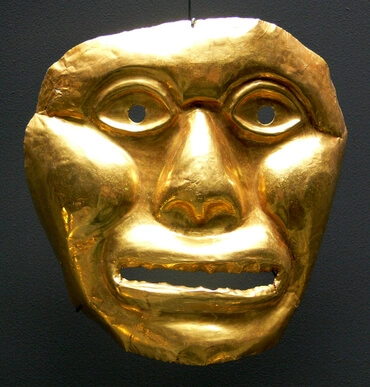1
Od bagremova drva napravi žrtvenik za žrtve paljenice, pet lakata dug, pet lakata širok - u četvorinu - a tri lakta visok.
2
Na njegova četiri ugla načini mu četiri roga. Rogovi su bili u jednom komadu s njim. Onda ga obloži tučem.
3
A načini i sav pribor za žrtvenik: lonce, strugače, kotliće, viljuške i kadionike; sav mu je ovaj pribor načinio od tuča.
4
Za žrtvenik zatim načini rešetku u obliku mrežice od tuča ispod izbočine; zahvaćala mu je do sredine.
5
Salije četiri koluta na četiri ugla tučane rešetke da služe kao kvake za motke.
6
Motke načini od bagremova drva pa ih obloži tučem.
7
Onda provuče motke kroz kolutove na objema stranama žrtvenika da se na njima nosi. Napravio ga je šuplja - od dasaka.
8
A zatim, od zrcala žena koje su posluživale na vratima Šatora sastanka, načini tučani umivaonik i tučani stalak za nj.
9
Onda načini dvorište. Na južnoj strani dvorišta bijahu zavjese od prepredenog lana, stotinu lakata duge.
10
Njihovih dvadeset stupova sa dvadeset podnožja bilo je od tuča, dok su kuke na stupovima i njihove šipke bile od srebra.
11
Od stotinu lakata bile su zavjese i sa sjeverne strane. Njihovih dvadeset stupova sa dvadeset podnožja bilo je od tuča, dok su kuke na stupovima i njihove šipke bile od srebra.
12
Sa zapadne strane bijahu zavjese od pedeset lakata, sa deset stupova i deset njihovih podnožja. Kuke su na stupovima i njihove šipke bile od srebra.
13
Sprijeda, s istoka, zavjese od pedeset lakata.
14
S jedne strane vrata zavjese su bile petnaest lakata, sa tri stupca i njihova tri podnožja.
15
Tako i s druge strane - dakle, na obje strane dvorišnih vrata - bile su zavjese od petnaest lakata, sa tri stupca i njihova tri podnožja.
16
Sve su zavjese oko dvorišta bile od prepredenog lana.
17
Podnožja za stupove bila su od tuča, a kuke na stupovima i njihove šipke od srebra. Vrhovi stupova bili su srebrom obloženi. Sve šipke na dvorišnim stupovima bijahu od srebra.
18
Zavjesa na dvorišnim vratima - izvezena - bila je od ljubičastog, crvenog i tamnocrvenog prediva i prepredenog lana. Dvadeset je lakata bila duga; visoka, po širini, pet lakata kao i dvorišne zavjese.
19
Bila su četiri njihova stupa sa četiri podnožja od tuča. Kuke na stupovima bile su od srebra. Vrhovi stupova bili su srebrom obloženi, a njihove šipke bile su srebrne.
20
Svi kočići unutar Prebivališta bili su od tuča.
21
To je popis stvari za Prebivalište - Prebivalište Svjedočanstva, koji je sastavljen na zapovijed Mojsijevu trudom levita pod vodstvom Itamara, sina svećenika Arona.
22
Besalel, Urijev sin, iz koljena Hurova od plemena Judina napravio je sve što je Jahve Mojsiju naredio.
23
S njim je bio Oholiab, sin Ahisamakov, iz plemena Danova, rezbar, krojač i vezilac za ljubičasto, crveno i tamnocrveno predivo i prepredeni lan.
24
Sve zlato što je utrošeno u radove oko Svetišta - zlato posvećeno prinosom - iznosilo je: dvadeset i devet talenata i sedam stotina trideset šekela u hramskim šekelima.
25
A srebro, sabrano prigodom upisivanja zajednice -
26
to jest beku po glavi, odnosno pola šekela prema hramskom šekelu, od svakoga koji je bio upisan, od dvadeset godina pa naprijed - iznosilo je: stotinu talenata i tisuću sedam stotina sedamdeset i pet šekela u hramskim šekelima. Bilo je upisanih: šest stotina tri tisuće i petsto pedeset.
27
Stotinu talenata srebra otišlo je za salijevanje podnožja Svetištu i zavjesi: sto podnožja od sto talenata - talenat za podnožje.
28
A od tisuću sedam stotina sedamdeset i pet šekela načinio je kuke za stupove, obložio njihove vrhove i napravio šipke za njih.
29
Tuč od žrtve prikaznice iznosio je sedamdeset talenata i dvije tisuće četiri stotine šekela.
30
Od njega je načinio: podnožja za ulaz u Šator sastanka, žrtvenik od tuča s njegovom tučanom rešetkom i sav pribor za žrtvenik;
31
dalje, podnožja oko dvorišta, podnožja za dvorišni ulaz; sve kočiće za Prebivalište i sve kočiće oko dvorišta.








